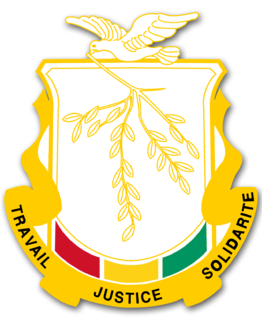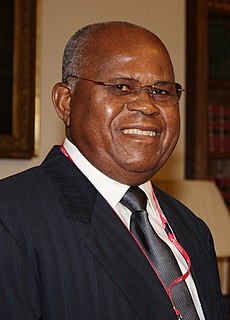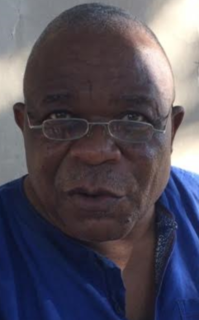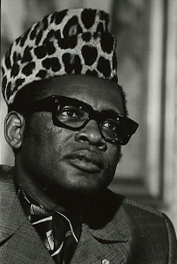
Zaire, officially the Republic of Zaire, was the name of a sovereign state between 1971 and 1997 in Central Africa that is now known as Democratic Republic of the Congo. The country was a one-party totalitarian dictatorship, run by Mobutu Sese Seko and his ruling Popular Movement of the Revolution party. Zaire was established following Mobutu's seizure of power in a military coup in 1965, following five years of political upheaval following independence known as the Congo Crisis. Zaire had a strongly centralist constitution, and foreign assets were nationalised. The period is sometimes referred to as the Second Congolese Republic.

Léon Kengo wa Dondo is a Congolese politician who served as the "first state commissioner" several times under Mobutu Sese Seko in Zaïre. He was one of the most powerful figures in the regime and was a strong advocate of economic globalization and free-market economics. Since 2007, he has been President of the Senate of the Democratic Republic of the Congo.

The Congolese Party of Labour, founded in 1969 by Marien Ngouabi, is the ruling political party of the Republic of the Congo. It was originally a Marxist-Leninist pro-Soviet party, which founded the People's Republic of the Congo, but moved towards a moderate left-wing stance in the early 1990s. Denis Sassou Nguesso is President of the PCT Central Committee, and Pierre Ngolo is the PCT's Secretary-General.

Guinea elects on the national level a head of state—the president—and a legislature. The president is elected for a five-year term by the people through a two-round system. The National Assembly has 114 members, elected for five-year terms, 38 members in single-seat constituencies and 76 members by proportional representation.

Étienne Tshisekedi wa Mulumba was a Congolese politician and the leader of the Union for Democracy and Social Progress (UDPS), the main opposing political party in the Democratic Republic of the Congo (DRC). A long-time opposition leader, he served as Prime Minister of the country on three brief occasions: in 1991, 1992–1993, and 1997.

A parliamentary election was held in the Republic of the Congo on 24 June 2007, with a second round initially planned for 22 July 2007, but then postponed to 5 August 2007. According to the National Commission of the Organization of the Elections (CONEL), 1,807 candidates stood in the first round for 137 seats in the National Assembly. The ruling Congolese Labour Party and parties and independent candidates allied with it won 125 seats, while two opposition parties won a combined 12 seats.

A presidential election was held in the Republic of the Congo on 10 March 2002. This followed the country's second civil war (1997-1999), which returned Denis Sassou Nguesso to power, and a subsequent transitional period, in which a new constitution was written and approved by referendum in January 2002.
Justin Koumba is a Congolese politician who was President of the National Assembly of Congo-Brazzaville from 2007 to 2017. He was an official at the United Nations and served in the government of Congo-Brazzaville as Minister of National Education in 1992; subsequently, he was President of the National Transitional Council from 1998 to 2002 and President of the National Human Rights Commission from 2003 to 2007.
Auguste-Célestin Gongarad Nkoua is a Congolese politician and the President of the Patriotic Union for Democracy and Progress (UPDP), a political party. He served in the government of Congo-Brazzaville as Minister of Agriculture and Animal Husbandry from 1991 to 1992, as Minister of Water and Forests from 1992 to 1993, and again as Minister of Agriculture and Animal Husbandry from 1997 to 2002. Subsequently he was President of the Economic and Social Council, a state institution, from 2003 to 2009. In 2009, he was appointed as President Denis Sassou Nguesso's Personal Representative for Political Affairs.

Clément Miérassa is a Congolese politician who has been President of the Congolese Social Democratic Party (PSDC) since 1990. He served in the government of Congo-Brazzaville as Minister of Trade from 1991 to 1992 and as Minister of Industrial Development from 1992 to 1993. Miérassa was also a minor candidate in the 1992 presidential election as well as the 2009 presidential election.

Presidential elections were held in the Democratic Republic of the Congo on 1 November 1970. The only candidate was Joseph Mobutu, who had taken power in a military coup five years earlier. The elections took the format of a "yes" or "no" vote for Mobutu's candidacy, with the results showing he won more "yes" votes than the number of registered voters, even though voting was not compulsory.

Parliamentary elections were held in Zaire on 2 November 1975. At the time, the country was a one-party state with the Popular Movement of the Revolution (MPR) as the only legally permitted party. Voters approved a single list of 244 MPR candidates. Instead of the "costly and complicated" system of casting ballots, the election took place by "acclaim." Candidates were simply presented at public locations such as stadiums, and the audience cheered for them.

Legislative elections took place on 10 and 17 June 2012 to select the members of the 14th National Assembly of the French Fifth Republic – a little over a month after the French presidential election run-off held on 6 May.

The Tenth constituency for French residents overseas is one of eleven constituencies each electing one representative of French citizens overseas to the French National Assembly.

The Constitution of Zaire, was promulgated on 15 August 1974, revised on 15 February 1978, and amended on 5 July 1990. Defining state power as an extension of the individual powers of Mobutu Sese Seko, the 1974 constitution codified Zaire as a one-party dictatorship and enshrined the status of Mobutism as the state ideology, together with the dominant position of the ruling Popular Movement of the Revolution (MPR) party. The 1974 constitution was the third in the Congo's post-independence history, replacing earlier constitutions adopted to replace the original basic law of 1960, adopted in 1964 and 1967.

Congo’s electoral law was approved in 2001 and amended in 2007, 2012, 2014 and 2016. It aims to provide the conditions for a democratic and transparent electoral system, from campaigning and media access through voter registration, vote counting and certification.

Parliamentary elections were held in the Republic of the Congo on 16 July 2017, with a second round of voting following on 30 July in constituencies where no candidate secured a majority.
Yvon Kimpiobi or Kimpiob-Ninafiding Nki-Ekundi is a Congolese politician who served twice as the President of the Chamber of Deputies of the Democratic Republic of the Congo.
Henri-Thomas Lokondo Yoka is a Congolese politician serving as a deputy in the Democratic Republic of the Congo National Assembly since 2011. He previously held office as Deputy Minister of Public Works from 1993 until 1994 and Deputy Minister of Foreign Relations from 1996 until 1997. In the 2000s he formed his own party, the Union Congolaise pour la Liberté.














